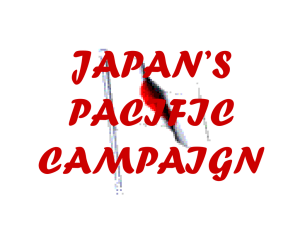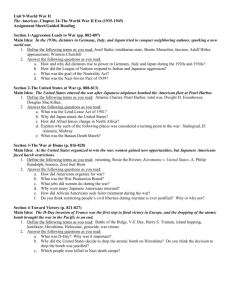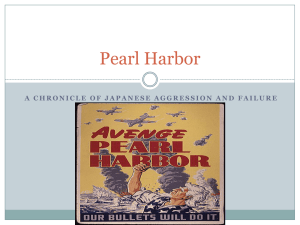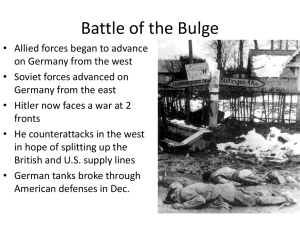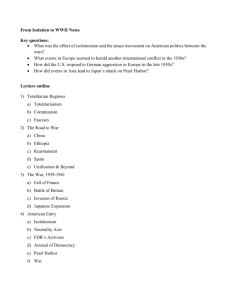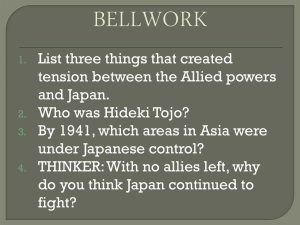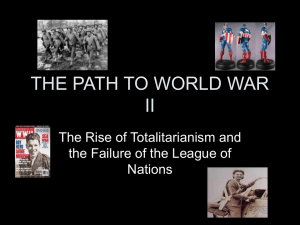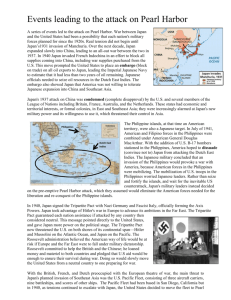Pearl Harbor Dec 7, 1941
advertisement
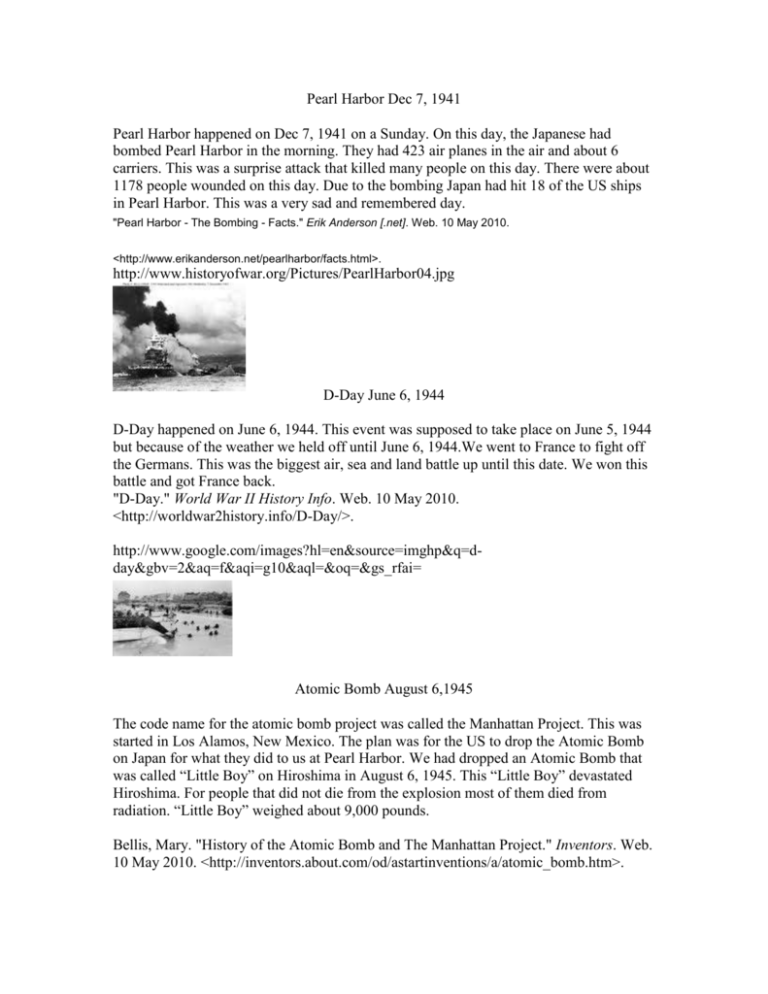
Pearl Harbor Dec 7, 1941 Pearl Harbor happened on Dec 7, 1941 on a Sunday. On this day, the Japanese had bombed Pearl Harbor in the morning. They had 423 air planes in the air and about 6 carriers. This was a surprise attack that killed many people on this day. There were about 1178 people wounded on this day. Due to the bombing Japan had hit 18 of the US ships in Pearl Harbor. This was a very sad and remembered day. "Pearl Harbor - The Bombing - Facts." Erik Anderson [.net]. Web. 10 May 2010. <http://www.erikanderson.net/pearlharbor/facts.html>. http://www.historyofwar.org/Pictures/PearlHarbor04.jpg D-Day June 6, 1944 D-Day happened on June 6, 1944. This event was supposed to take place on June 5, 1944 but because of the weather we held off until June 6, 1944.We went to France to fight off the Germans. This was the biggest air, sea and land battle up until this date. We won this battle and got France back. "D-Day." World War II History Info. Web. 10 May 2010. <http://worldwar2history.info/D-Day/>. http://www.google.com/images?hl=en&source=imghp&q=dday&gbv=2&aq=f&aqi=g10&aql=&oq=&gs_rfai= Atomic Bomb August 6,1945 The code name for the atomic bomb project was called the Manhattan Project. This was started in Los Alamos, New Mexico. The plan was for the US to drop the Atomic Bomb on Japan for what they did to us at Pearl Harbor. We had dropped an Atomic Bomb that was called “Little Boy” on Hiroshima in August 6, 1945. This “Little Boy” devastated Hiroshima. For people that did not die from the explosion most of them died from radiation. “Little Boy” weighed about 9,000 pounds. Bellis, Mary. "History of the Atomic Bomb and The Manhattan Project." Inventors. Web. 10 May 2010. <http://inventors.about.com/od/astartinventions/a/atomic_bomb.htm>. http://ocw.nd.edu/physics/nuclear-warfare/littleboy.jpg VE day May 8, 1945 This day took place on May 8, 1945. VE day stands for Victory in Europe day. This was when the Germans finally surrendered. Since we were beating them the Germans had no choice but to surrender unless they wanted everyone to die. After this war, Germany agreed to go to war with Japan on the United States side. "V-E Day Is Celebrated in American and Britain — History.com This Day in History — 5/8/1945." The History Channel — Home Page. Web. 10 May 2010. <http://www.history.com/this-day-in-history/v-e-day-is-celebrated-in-american-andbritain>. http://news.bbc.co.uk/nol/shared/spl/hi/pop_ups/05/uk_ve_day_newspapers/img/1.jpg Nonaggression Pact Germany and Russia had made a nonaggression Pact which said that they would not hit each other or go into war with each other. This is different from having an ally because if you are an ally with another country that means that if they get attacked you will help them in war and vice versa. So Germany made this Pact with Russia to avoid fighting on 2 fronts which ment he would be able to send everyone to fight on one front and that would give him more power. Later on Germany had pretty much said screw this pact and attacked Russia. Rosenberg, Jennifer. "The Nazi-Soviet Non-Aggression Pact - The 1939 Agreement Between Hitler and Stalin." 20th Century History. Web. 10 May 2010. <http://history1900s.about.com/od/worldwarii/a/nonaggression.htm>. http://hsudarren.files.wordpress.com/2009/04/a_stab_in_the_back.gif Philippines Dec 8, 1941 The Japan had invaded the Philippines the day after the bombing of Pearl Harbor which is Dec 8, 1941. At this time we were in control of the Philippines but we could not do anything when Japan invaded it because we were still suffering from the Pearl Harbor attack. We did not have enough time to react to the battle of the Philippines. Japan had used this battle death march which consisted of about 75,000 US troops and made them march and anyone who fell behind or walked to slow they killed. "The Philippines December 8, 1941 - May 8, 1942 - World War II Multimedia Database." World War II Multmedia Database. Web. 10 May 2010. <http://worldwar2database.com/html/philip42.htm>. http://upload.wikimedia.org/wikipedia/commons/4/4a/Bicyclemounted_Japanese_Troops_in_the_Philippines.jpg Island hopping In WW2 against Japan, we used the method island hopping. What this was is we would go from island to island pushing the Japanese back to their mainland. The biggest island was Tinian which had an airport in which we used to get the plane in the air carrying the Atomic Bomb “Little Boy” which was dropped on Hiroshima. We wanted this island so that we could be closer to Japans mainland. So by capturing these islands we could get closer and that ment we could attack quicker. "Island Hopping." United States History. Web. 10 May 2010. <http://www.u-shistory.com/pages/h1671.html>. http://www.mcarterbrown.com/gallery/data/500/island_hopping_wwii.jpg VJ day This event had taken place on August 14, 1945. This was the day Japan had surrendered to the Allies. They made a formal surrender in Tokyo Bay. Since Japan had surrendered this had ended WWII. "Victory in Japan (V-J) Day — History.com Articles, Video, Pictures and Facts." The History Channel — Home Page. Web. 10 May 2010. <http://www.history.com/topics/v-jday>. http://www.skylighters.org/vjday/header1.jpg Battle of the Coral Sea This battle was on May 7-8, 1942. This battle took place on the sea southwest of the Solomon Islands and we were fighting the Japanese. The Japanese were trying to create a powerful empire so we decided we didn’t like their idea and started this battle to keep them from doing that. "Battle of the Coral Sea." Naval History and Heritage Command. Web. 10 May 2010. <http://www.history.navy.mil/photos/events/wwii-pac/coralsea/coralsea.htm>. http://www.knowledgerush.com/wiki_image/8/87/BattleCoralSea.jpeg Battle of Leyte Gulf This battle took place on Oct 23, 1944. We were fighting the Japanese. This was the biggest sea battle ever in history. It was also the first time the Japanese used Kamikaze, which were suicide bombers pretty much. They would run their plane into the ship. It would take a lot of honor for someone to commit suicide in order to take down a ship. We won this battle over the Japanese. "Battle of Leyte Gulf." United States History. Web. 10 May 2010. <http://www.u-shistory.com/pages/h1757.html>. http://www.defense.gov/home/images/features/10-20-04/Page-01-Banner4.jpg
